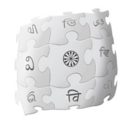Module:Includes/doc: Difference between revisions
https://sandbox.indicwiki.org/index.php/>Ahecht →fromIndex: conventional |
m 1 revision imported |
(No difference)
| |
Latest revision as of 08:54, 12 December 2024
| Template:Strong for Template:Terminate sentence It may contain usage information, categories and other content that is not part of the original module page. |
Lua equivalent to the javascript Array.prototype.includes() function, except fromIndex is 1-indexed instead of zero-indexed. Determines whether an array includes a certain value and returns true or false.
Syntax[edit source]
includes(array, searchElement)
includes(array, searchElement, fromIndex)array[edit source]
array is the array to search. If type(array) ~= 'table' the module will return false.
value[edit source]
value is the value to be tested. If value is present in the array, the module will return true. If value is missing the module will return false.
fromIndex[edit source]
fromIndex is the optional 1-based index at which to start searching. If fromIndex is not present, all values in the array will be searched and the array will be treated as a table/associative array (it will be iterated over using pairs()).
If fromIndex is present and an integer, the array is assumed to be a conventional array/sequence/list (indexed with consecutive integer keys starting at 1, and interated over using ipairs()). Only the values whose index is fromIndex or higher will be searched.
In the following examples, #array represents the length of the integer-keyed portion of the array.
- If
fromIndex < 0it will count back from the end of the array, e.g. a value of-1will only search the last integer-keyed element in the array. IffromIndex <= (-1 * #array), the entire integer-keyed portion of the array will be searched. - If
fromIndex = 0it will be treated as a1and the entire integer-keyed portion of the array will be searched. - If
fromIndex > #array, the array is not searched andfalseis returned.
Usage[edit source]
local includes = require('Module:Includes')
-- These will return true
includes({"a", "b", "c", "d"}, "b")
includes({"a", "b", "c", "d"}, "b", 0)
includes({"a", "b", "c", "d"}, "b", 1)
includes({"a", "b", "c", "d"}, "b", 2)
includes({"a", "b", "c", "d"}, "b", -3)
includes({"a", "b", "c", "d"}, "b", -5)
includes({[1] = "a",[100] = "b",[101] = "c"}, "b")
includes({[1] = "a",[2] = "b",[3] = "c"}, "b", 0)
includes({first = "a", second = "b", third = "c"}, "b")
--these will return false
includes("b","b") -- array is not a table
includes({"a", "b", "c", "d"}) -- value missing
includes({"a", "b", "c", "d"}, "e") -- "e" is not in array
includes({"a", "b", "c", "d"}, "b", 3) -- "b" is before position 3
includes({"a", "b", "c", "d"}, "b", 5) -- 5 is larger than #array
includes({"a", "b", "c", "d"}, "b", -2) -- "b" is not in the last two positions
includes({[1] = "a", [100] = "b", [101] = "c"}, "b", 0) -- key 100 is non-consecutive
includes({first = "a", second = "b", third = "c"}, "b", 0) -- key "second" is not an integer
